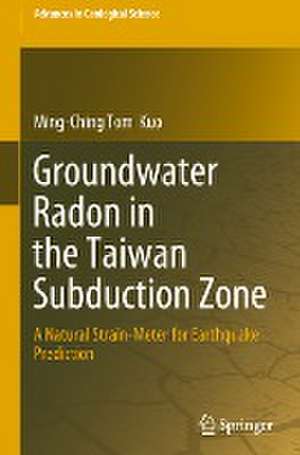Groundwater Radon in the Taiwan Subduction Zone: A Natural Strain-Meter for Earthquake Prediction: Advances in Geological Science
Autor Ming-Ching Tom Kuoen Limba Engleză Hardback – 9 sep 2023
Between 2003 and 2010, anomalous declines in groundwater radon concentration were recurrently recorded at Antung, Taiwan, which are considered as precursory to local major earthquakes. The correlations between radon decline and earthquake magnitude are useful for early warning of local main earthquakes.
The book consists of 7 chapters. Chapter 1 presents background information and the objectives of the book. Chapter 2 illustrates the methods of monitoring groundwater radon and a brief review of earthquake prediction research using groundwater radon. Chapter 3 provides the details of anomalous decrease in groundwater radon before the Taiwan Mw 6.8 Chengkung Earthquake of 2003. Chapter 4 provides the description of the mechanism of groundwater-radon volatilization. Chapter 5 shows the recurrent anomalous declines in groundwater radon concentration consistently recorded at Antung, Taiwan, prior to local main earthquakes that occurred between 2003 and 2010. Monitoring groundwater radon in small, unconfined fractured aquifers is explained in Chapter 6, followed by an analysis of correlating precursory declines in groundwater radon, precursory time with earthquake magnitudes for small, confined fractured aquifers in Chapter 7.
Preț: 886.92 lei
Preț vechi: 1081.62 lei
-18% Nou
Puncte Express: 1330
Preț estimativ în valută:
169.76€ • 176.55$ • 142.26£
169.76€ • 176.55$ • 142.26£
Carte tipărită la comandă
Livrare economică 14-28 martie
Preluare comenzi: 021 569.72.76
Specificații
ISBN-13: 9789819953493
ISBN-10: 9819953499
Ilustrații: XIX, 83 p. 41 illus., 12 illus. in color.
Dimensiuni: 155 x 235 mm
Greutate: 0.33 kg
Ediția:1st ed. 2023
Editura: Springer Nature Singapore
Colecția Springer
Seria Advances in Geological Science
Locul publicării:Singapore, Singapore
ISBN-10: 9819953499
Ilustrații: XIX, 83 p. 41 illus., 12 illus. in color.
Dimensiuni: 155 x 235 mm
Greutate: 0.33 kg
Ediția:1st ed. 2023
Editura: Springer Nature Singapore
Colecția Springer
Seria Advances in Geological Science
Locul publicării:Singapore, Singapore
Cuprins
- Introduction.- Methods of Monitoring Groundwater Radon.- Anomalous Radon Decline at Antung Hot Spring before the 2003 Mw 6.8 Chengkung Earthquake.- A Physical Mechanism of Groundwater-Radon Volatilization.- Recurrences of Radon Anomalies Precursory to Local Main Earthquakes at Antung Hot Spring.- Anomalous Radon Declines in Small Unconfined Aquifers: Corroboration of Favorable Geological Conditions.- Anomalous Radon Declines in Small Confined Aquifers: Evaluation of Global Data.
Notă biografică
Ming-Ching Tom Kuo, Ph.D., is a professor of petroleum engineering at National Cheng Kung University, Taiwan. He gained his industrial experience while working at Stanford Research Institute, Occidental Petroleum, and Mobil. He is experienced in oil, gas, and geothermal production. His research interests include groundwater hydrology, groundwater and soil remediation, and monitoring of groundwater radon. Since 2003, his research has focused on the applications of recurrent radon precursors to forecast local large earthquakes in the Taiwan subduction zone.
Dr. Kuo earned his B.S. degree in chemical engineering from National Taiwan University, an M.S. in chemical engineering from Kansas State University, and a Ph.D. in environmental engineering from Stanford University.
Dr. Kuo earned his B.S. degree in chemical engineering from National Taiwan University, an M.S. in chemical engineering from Kansas State University, and a Ph.D. in environmental engineering from Stanford University.
Textul de pe ultima copertă
This book presents the mechanism of in-situ radon volatilization and outlines the geological requisites to site a radon monitoring well for earthquake warning. A small fractured aquifer under undrained conditions is an effective natural strain meter for earthquake prediction. It shows significant merit on a local basis, and most importantly, the analysis can also be applied globally in subduction zones with similar tectonic settings and physical–chemical relationships.
Between 2003 and 2010, anomalous declines in groundwater radon concentration were recurrently recorded at Antung, Taiwan, which are considered as precursory to local major earthquakes. The correlations between radon decline and earthquake magnitude are useful for early warning of local main earthquakes.
The book consists of 7 chapters. Chapter 1 presents background information and the objectives of the book. Chapter 2 illustrates the methods of monitoring groundwater radon and a brief review of earthquake prediction research using groundwater radon. Chapter 3 provides the details of anomalous decrease in groundwater radon before the Taiwan Mw 6.8 Chengkung Earthquake of 2003. Chapter 4 provides the description of the mechanism of groundwater-radon volatilization. Chapter 5 shows the recurrent anomalous declines in groundwater radon concentration consistently recorded at Antung, Taiwan, prior to local main earthquakes that occurred between 2003 and 2010. Monitoring groundwater radon in small, unconfined fractured aquifers is explained in Chapter 6, followed by an analysis of correlating precursory declines in groundwater radon, precursory time with earthquake magnitudes for small, confined fractured aquifers in Chapter 7.
Between 2003 and 2010, anomalous declines in groundwater radon concentration were recurrently recorded at Antung, Taiwan, which are considered as precursory to local major earthquakes. The correlations between radon decline and earthquake magnitude are useful for early warning of local main earthquakes.
The book consists of 7 chapters. Chapter 1 presents background information and the objectives of the book. Chapter 2 illustrates the methods of monitoring groundwater radon and a brief review of earthquake prediction research using groundwater radon. Chapter 3 provides the details of anomalous decrease in groundwater radon before the Taiwan Mw 6.8 Chengkung Earthquake of 2003. Chapter 4 provides the description of the mechanism of groundwater-radon volatilization. Chapter 5 shows the recurrent anomalous declines in groundwater radon concentration consistently recorded at Antung, Taiwan, prior to local main earthquakes that occurred between 2003 and 2010. Monitoring groundwater radon in small, unconfined fractured aquifers is explained in Chapter 6, followed by an analysis of correlating precursory declines in groundwater radon, precursory time with earthquake magnitudes for small, confined fractured aquifers in Chapter 7.
Caracteristici
Focuses on how to monitor anomalous declines in groundwater radon concentration Outlines geological requisites to site a radon monitoring well Presents a physical mechanism to explain radon anomalies









